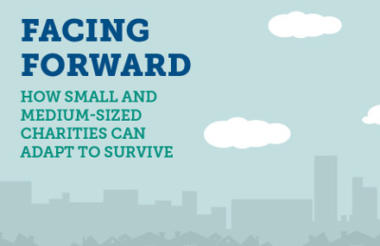Small charities face a "hurricane of change" in the economic, political and technological environment they operate in, and government and funders must change the way they operate to help, according to a report today.
The report Facing Forward, How small charities can adapt to survive, is published by the Lloyds Bank Foundation for England and Wales. It calls for government, funders and larger charities to take action to help small charities in challenging times, but also says that small charities need to adapt by looking for alternative funding streams and working in different ways if they want to survive.
It comes a few months after the foundation published a report warning that the commissioning is in "crisis".
“By working creatively, collaborating and maximising the potential of new technology, charities can continue to meet new needs that their beneficiaries and communities present with and secure new resources,” the report says.
It also calls on government to reform the commissioning process and grant funders to provide support for capacity building.
“Both statutory and independent funders must nurture smaller charities, providing the long term core and flexible funding and capacity building support that they need to thrive,” the report says.
The report says that large charities should stop competing with smaller charities and work with them instead and “recognise how their smaller counterparts are a distinctive and fundamental part of the voluntary sector ecosystem, but they can be made or broken accordingly by how large charities act towards them.”
‘The futures of essential services is at risk if we don’t act’
Paul Streets, chief executive of the Lloyds Bank Foundation for England and Wales, called for urgent action.
He said: “For many small and local charities, issues like Brexit and the changing political landscape can be difficult to plan for if you’re facing a constant battle to deliver essential public services, with ever dwindling resources.
“Charities want to be prepared and we hope Facing Forward helps them face up to the hurricane of change heading their way and plan a way forward, but the responsibility doesn’t end there.
“We’re doing our bit by improving our grant making and continuing to lobby for change, but government, other funders and larger charities must also set out how they will support small charities through the tough times ahead.
“The future of too many essential public services and charities working at the heart of local communities is at risk if we don’t collectively act now.”
In Charity Finance
Ten trends
The report identified ten trends for charities to watch:
1. The road to Brexit
2. Political showdowns and slowdowns
Ensuring their issues are on the agenda will be a key concern for smaller charities – effective relationships with local MPs and councillors will be vital.
3. Unpredictable economy
The economy may be subject to significant change, depending on whether the UK secures a new (permanent or interim) trade deal with the EU. Smaller charities need a Plan B in case of worsening economic outlook.
4. Local government at a tipping point
Already cut by 40 per cent since 2010, some council services face breaking point. New measures to allow councils to retain business rate income from 2020 could exacerbate regional variations.
5. Reshaping of public services
Facing further cuts, many public services will be put under significant additional pressure. This could exacerbate current trends – including the numerous challenges in commissioning and procurement - and result in poorer outcomes, particularly for the most vulnerable people.
6. Social divides
The Leave vs Remain debates exposed sharp divisions in British society, something that charities were already well aware of. Locally based smaller charities are often best-placed to facilitate community events and engagement, as well as represent their communities in wider discussions and this is likely to become increasingly important.
7. The way we work
The rise of the gig economy and job instability looks set to continue.
8. Beyond the internet
The digital divide is likely to widen, increasing people’s need to skill-up and retrain. This affects the way charities operate themselves as well as the support they need to give individuals.
9. Public trust
High public trust in local charities has not diminished, despite falling levels of trust in the sector as a whole. This presents an opportunity for smaller charities, but also a responsibility to ensure they continue to uphold this trust.
10. A renewed vision for civil society
The Prime Minister has set out her vision of a “shared society” in which government takes a more active role in supporting the voluntary sector. Whilst this is set against a backdrop of ongoing cuts, it is nonetheless a welcome statement of intent. The voluntary sector however, needs to proactively shape its own future and ensure that the voices that are heard are not just the loudest and biggest.
Related articles












